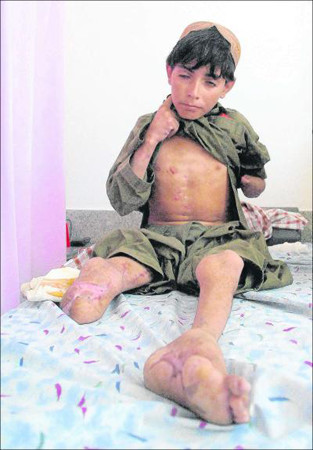By Jonathan Montpetit
Essa Mohammad was tending to his family’s flock of sheep in Kandahar’s Arghandab district this summer when a sudden bang and flash of light knocked him unconscious.

Essa Mohammad, 12, was injured by an IED blast. (Photo: JONATHAN MONTPETIT / CP)
When the 12-year-old boy woke up several days later, he was missing his right leg, left arm and right eye — the toll taken by an improvised explosive device planted by insurgents.
After initially taking Essa to Pakistan for treatment, Rozi Mohammad brought his son to the Kandahar Physical Rehabilitation Centre, the only site in southern Afghanistan offering sustained therapy for the disabled.
It sits at the back of the Mirwais hospital campus, a leafy oasis of calm amid the crowded and often violent streets of Kandahar city.
The centre has been busy lately as more and more civilian casualties limp, crawl or are carried through its doors each year.
Its grey rooms are receptacles for the forgotten victims of this nine-year war; those not doing the fighting but who are nevertheless caught in its wake.
"This changed our life," says the elder Mohammad, his fingers dangling a set of prayer beads. "Our whole family is upset."
The father looks on intently as his son’s bandages are changed. Before he returns home, Essa will be outfitted with a special crutch. There is not enough muscle on his emaciated legs to support a prosthetic limb.
"Most of our patients are here because of injuries from landmines," says Dost Mohammad, head of the centre’s physiotherapy department. "They come from Urzugan, Zabul, Helmand — all over the south."
Not coincidentally, these are also areas that have seen some of the fiercest fighting in recent months as NATO and Afghan troops continue their aggressive push against insurgent redoubts.
"Due to the security incidents in the region, day by day the number of the patients goes up," says Mohammad Ehsan, who oversees the centre’s operations for its main donor, Handicap International (HI) — a humanitarian organization with 250 projects in more than 60 countries in Africa, Latin America, Asia and Europe.
The Canadian International Development Agency, or CIDA, will contribute close to $1 million to the centre through HI this year.
The centre’s estimated 4,000 patients include many of the indirect victims of a conflict that has ravaged access to public health services, such as those suffering from cerebral palsy, spina bifida and polio.
The upsurge in violence has restricted a recent polio vaccination campaign, and as a result Afghanistan is seeing new cases of a disease that has been all but eradicated in the rest of the world.
What health services Kandahar does offer are rarely extended into rural areas, where roads are often pockmarked with IEDs and the Taliban punishes any interaction with the government. Treatable infections, diseases and other minor medical conditions quickly become crippling problems for villagers too afraid to travel for help.
"Where the security is bad, the health care is also not very good because the people in the villages cannot get to the health facilities," says Dr. Dawood Farhad, director of Mirwais Hospital, the busiest in the south.
"So when we get the patients they already have complicated cases."
To help offset the burden of making the long trip into Kandahar city, the rehabilitation centre has guest rooms for families. Their relatives are provided meals as well, while the treatment itself is offered free of charge.
A good part of the centre’s staff of 59 is dedicated to building prosthetics, wheelchairs, crutches and splints. There are also cobblers making orthopedic shoes. They even have machinists who construct the nuts, washers, screws and bolts needed for the various therapeutic devices on offer.
The centre has no choice but to supply itself, Ehsan says — there is simply nowhere else in Afghanistan to get the materials. He estimates that, per month, they produce 135 walking aides, 60 orthopedic devices and 28 prosthetic limbs.
The mere existence of such a place in the deeply conservative southern province of Kandahar sends a progressive message. If life is already hard in today’s Afghanistan, it is harder still for the disabled.
"Here in Afghanistan people with disabilities are ignored from the societies, even from their families," said Ehsan. "So it creates lots of problems in their lives."
It is one of the many paradoxes of life in a society whose values have been forged by almost three generations of incessant war. While former mujahedeen who were maimed fighting the Soviets enjoy a certain prestige, those who came by their disabilities in some other fashion face a lifetime of dependency, unemployment and poverty.
Lal Mohammad, 28, is struggling with that prospect as he breaks in his new prosthetic leg. He figures his career as a tuk-tuk driver in Kandahar city came to abrupt end when NATO soldiers shot him as he approached their patrol.
"I wasn’t driving fast," he says, dismissing claims he could have been mistaken for a suicide bomber. "I was going slow."
Mohammad was due to get married shortly after the incident occurred. But, unable to work, he hasn’t gathered enough money to pay the dowry to his potential bride’s family. He is holding out for financial compensation from NATO forces.
"I haven’t received a single penny for their mistake," he says during a break in his therapy session. "When I leave the hospital I don’t know what to do to feed myself or my family."
Staff at the rehabilitation centre consider it part of their mandate to advocate on behalf of the disabled. They try to find schooling and training programs for their patients, while also raising awareness of their rights.



